Researchers get to the “bottom” of how beetles use their butts to stay hydrated
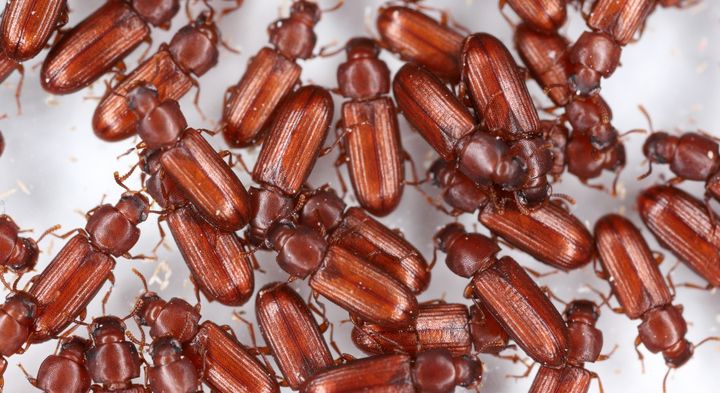
Insect pests eat their way through thousands of tons of food around the world every year. Food security in developing nations is particularly affected by animal species like the grain weevil and red flour beetle which have specialized in surviving in extremely dry environments, granaries included, for thousands of years.
In a new study, researchers at the University of Copenhagen’s Department of Biology investigated the molecular and physiological processes underlying the ability of beetles to survive their entire lives without drinking any liquid water whatsoever. One of the secrets of this characteristic is found in their rear ends.
Indeed, beetles can open their rectums and take up water from moist air and convert it into fluid, which they can then absorb into their bodies. This novel approach to consuming water has been known for more than a century within scientific circles around the world, but never fully clarified until now.
"We have shed new light on the molecular mechanisms that allow beetles to absorb water rectally. Insects are particularly sensitive to changes in their water balance. As such, this knowledge can be used to develop more targeted methods to combat beetle species which destroy our food production, without killing other animals or harming humans and nature," says Associate Professor Kenneth Veland Halberg of the Department of Biology, who led the research.
Bone dry stool testifies to effective fluid extraction
The researchers studied the internal organs of red flour beetles to learn more about their ability to absorb water through the rectum. Red flour beetles are used as so-called model organisms, which means that they are offer tools that make them easy to work with and that their biology is similar to that found in other beetles.
Here, the researchers identified a gene that is expressed sixty times more in the beetle's rectum compared to the rest of the animal, which is higher than any other gene they found. This led them to a unique group of cells known as leptophragmata cells. Upon closer inspection, they could see that these cells play a crucial role when the beetle absorbs water through its rear end.
"Leptophragmata cells are tiny cells situated like windows between the beetle's kidneys and the insect circulatory system, or blood. As the beetle's kidneys encircle its hindgut, the leptophragmata cells function by pumping salts into the kidneys so that they are able to harvest water from moist air through their rectums and from here into their bodies. The gene we have discovered is essential to this process, which is new knowledge for us," explains Kenneth Veland Halberg.
Besides being able to suck water out of the air, beetles are also extremely effective at extracting liquid from food. Even dry grain, which may consist of 1-2 percent water, can contribute to a beetle’s fluid balance.
"A beetle can go through an entire life cycle without drinking liquid water. This is because of their modified rectum and closely applied kidneys, which together make a multi-organ system that is highly specialized in extracting water from the food that they eat and from the air around them. In fact, it happens so effectively that the stool samples we have examined were completely dry and without any trace of water," explains Kenneth Veland Halberg.
25 percent global food production is lost
Over the past 500 million years, beetles have successfully spread across the planet. Today, one in five animal species on Earth is a beetle. Unfortunately, beetles are also among the pests that have a devastating impact on our food security. The red flour beetle, grain weevil, confused flour beetle, Colorado potato beetle and other types of beetles make their way into up to 25 percent of the global food supply every year.
We use approximately $100 billion in pesticides worldwide every year to keep insects out of our food. However, traditional pesticides harm other living organisms and destroy the environment.
Therefore, according to Kenneth Veland Halberg, it is important to develop more specific and ‘eco-friendly’ insecticides, which only targets insect pests while leaving more beneficial insects, such as bees, alone. This is where a new and better understanding of beetles’ anatomy and physiology could become key.
"Now we understand exactly which genes, cells and molecules are at play in the beetle when it absorbs water in its rectum. This means that we suddenly have a grip on how to disrup these very efficient processes by, for example, developing insecticides that target this function and in doing so, kill the beetle," says Kenneth Veland Halberg, who adds:
"There is twenty times as much insect biomass on Earth than that of humans. They play key roles in most food webs have a huge impact on virtually all ecosystems and on human health. So, we need to understand them better," concludes the researcher.
Facts
- About one out of every five species on Earth is a beetle. Roughly 400,000 species have been described, but it is believed that there are well over a million in total.
- The researchers used the red flour beetle (Tribolium castaneum) as a model species for the study because it has a well-sequenced genome that allows for the use of a wide spectrum of genetic and molecular biology tools.
- Grain weevils, confused flour beetles, Colorado potato beetles and other types of beetles make their way into up to 25 percent of the global food supply every year.
- The problem is especially pronounced in developing countries, where access to effective pest control is limited or nonexistent.
- The project was conducted in collaboration with researchers from University of Copenhagen, Denmark and University of Glasgow and University of Edinburgh, Scotland, UK.
- The study was just published in the scientific journal, PNAS.
Contacts
Kenneth Veland Halberg
Associate Professor
Department of Biology
University of Copenhagen
Mobile: +45 26810458
Mail: kahalberg@bio.ku.dk
Michael Skov Jensen
Journalist & teamcoordinator
The Faculty of Science
University of Copenhagen
Mobile:+ 45 93 56 58 97
Mail:msj@science.ku.dk
Images
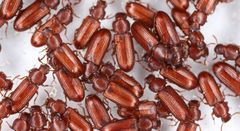
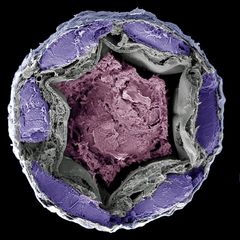
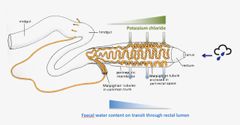
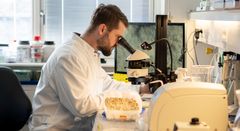
About Københavns Universitet
Københavns Universitet blev grundlagt i 1479 og har i dag cirka 37.000 studerende og 10.000 ansatte – heraf flere end 5.000 forskere – og en omsætning på 9,4 milliarder kroner. 10 nobelpriser er blevet tildelt forskere med tilknytning til universitetet.
Subscribe to releases from Københavns Universitet
Subscribe to all the latest releases from Københavns Universitet by registering your e-mail address below. You can unsubscribe at any time.
Latest releases from Københavns Universitet
Fermentering gør havets grøntsager mere spiselige5.12.2025 06:18:59 CET | Pressemeddelelse
Tang har længe været hyldet som en bæredygtig superingrediens – men dens “fiskede” smag er en barriere for mange vestlige forbrugere. Nu viser et nyt studie fra Københavns Universitet, at fermentering med mælkesyrebakterier kan være nøglen til at få tangen til at glide ned.
P-piller kan forringe kvinders mentale trivsel2.12.2025 06:05:00 CET | Pressemeddelelse
Adgang til p-piller i ungdomsårene er forbundet med øget risiko for depression senere i livet. Især kan kvinder, der er genetisk disponeret for psykisk sygdom, risikere at blive ramt af bivirkningen. Det viser et nyt studie fra Københavns Universitet.
Psykologer: Derfor kan protester samle folk på tværs af politiske skel27.11.2025 09:18:05 CET | Pressemeddelelse
Hvordan kan mennesker med diametralt modsatte holdninger pludselig stå skulder ved skulder i protest? Det spørgsmål har et internationalt forskerhold undersøgt. Udgangspunktet er COVID-protesterne, som blev båret af tre samlende strategier.
Sådan bruger planter ingeniørprincipper til at trænge gennem hård jord27.11.2025 07:16:00 CET | Pressemeddelelse
Et internationalt forskerhold med Københavns Universitet, Shanghai Jiao Tong University og University of Nottingham i spidsen har opdaget, hvordan planterødder er i stand til at trænge igennem hård og tæt jord ved hjælp af et velkendt ingeniørprincip. Opdagelsen kan få stor betydning for fremtidens afgrøder i en tid, hvor presset på landbrugsjorden stiger.
Forskere advarer: Klimaforandringer kan udvide levesteder for malariamyg27.11.2025 06:00:00 CET | Pressemeddelelse
Hvis vi ikke begrænser klimaforandringerne, så risikerer vi, at malariamyg udbreder deres levesteder i Afrika betydeligt. Det vil udsætte mange hundrede millioner mennesker for en højere smitterisiko.
In our pressroom you can read all our latest releases, find our press contacts, images, documents and other relevant information about us.
Visit our pressroom
